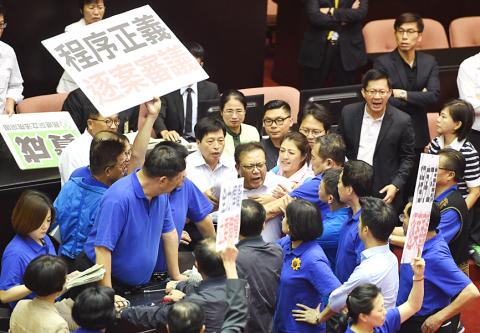Lawmakers yesterday voted on motions on the budget for the Forward-looking Infrastructure Development Program even as the Democratic Progressive Party (DPP) and the Chinese Nationalist Party (KMT) caucuses were in disagreement over how to address the motions.
KMT caucus secretary-general Lin Wei-chou (林為洲) said that during “informal talks” before a negotiation scheduled yesterday morning, the DPP caucus rejected the KMT’s demand that all of its motions be voted on and withdrew the window of negotiation.
That prompted the KMT to reverse its decision to reduce its number of motions from about 10,400 to 1,200, Lin said.

Photo: Chen Yu-fu, Taipei Times
“Only under one circumstance would we have reduced our motions: the DPP agreeing to vote on all our motions,” he added.
He accused Legislative Speaker Su Jia-chyuan (蘇嘉全) of attempting to collude with the DPP caucus to push the budget requests through a second reading by skipping all motions filed by the KMT, the New Power Party (NPP) and the People First Party, and only voting on 101 motions tendered by the DPP.
The DPP’s premise is that “a topic should not be voted on more than once,” which is “unacceptable,” as there is a “world of difference” between the KMT’s and the DPP’s motions, Lin said.
Even if the DPP’s logic stands, it should not put its own motions ahead of the KMT’s, which seek to slash or freeze larger proportions of the budgets, he added.
When informed that general motions tabled by the KMT were being addressed as he spoke, Lin said the DPP only did so to prevent its actions from “looking too dirty.”
The general motions dealt with the downsizing of the entire budget for the first phase of the infrastructure program, which totals NT$108.9 billion (US$3.6 billion).
Once the DPP finishes voting on motions that address chapters and sections in budget requests, which address projects and subprojects under the program respectively, it would skip all motions filed by other parties, Lin said.
The DPP’s move would likely be illegal, he said, urging Su to refrain from working with the DPP and becoming a “criminal.”
Su said the motions would be reviewed according to the law.
Lawmakers spent more than eight hours voting on general motions tendered by the KMT.
The first general motion sought to cut 99.9 percent off the budget, with each one that followed seeking to reduce the budget by an additional 0.1 percentage point.
After about 50 motions, the increment was increased to 1 percentage point.
Each vote was repeated once at the KMT’s request.
At press time last night, DPP lawmakers had vetoed 75 motions tabled by the KMT.
Su said that voting would be completed on Thursday next week at the earliest.

The manufacture of the remaining 28 M1A2T Abrams tanks Taiwan purchased from the US has recently been completed, and they are expected to be delivered within the next one to two months, a source said yesterday. The Ministry of National Defense is arranging cargo ships to transport the tanks to Taiwan as soon as possible, said the source, who is familiar with the matter. The estimated arrival time ranges from late this month to early next month, the source said. The 28 Abrams tanks make up the third and final batch of a total of 108 tanks, valued at about NT$40.5 billion

Travel agencies in Taiwan are working to secure alternative flights for travelers bound for New Zealand for the Lunar New Year holiday, as Air New Zealand workers are set to strike next week. The airline said that it has confirmed that the planned industrial action by its international wide-body cabin crew would go ahead on Thursday and Friday next week. While the Auckland-based carrier pledged to take reasonable measures to mitigate the impact of the workers’ strike, an Air New Zealand flight arriving at Taipei from Auckland on Thursday and another flight departing from Taipei for Auckland on Saturday would have to

A group from the Taiwanese Designers in Australia association yesterday represented Taiwan at the Midsumma Pride March in Melbourne. The march, held in the St. Kilda suburb, is the city’s largest LGBTQIA+ parade and the flagship event of the annual Midsumma Festival. It attracted more than 45,000 spectators who supported the 400 groups and 10,000 marchers that participated this year, the association said. Taiwanese Designers said they organized a team to march for Taiwan this year, joining politicians, government agencies, professionals and community organizations in showing support for LGBTQIA+ people and diverse communities. As the first country in Asia to legalize same-sex

MOTIVES QUESTIONED The PLA considers Xi’s policies toward Taiwan to be driven by personal considerations rather than military assessment, the Epoch Times reports Chinese President Xi Jinping’s (習近平) latest purge of the Chinese People’s Liberation Army (PLA) leadership might have been prompted by the military’s opposition to plans of invading Taiwan, the Epoch Times said. The Chinese military opposes waging war against Taiwan by a large consensus, putting it at odds with Xi’s vision, the Falun Gong-affiliated daily said in a report on Thursday, citing anonymous sources with insight into the PLA’s inner workings. The opposition is not the opinion of a few generals, but a widely shared view among the PLA cadre, the Epoch Times cited them as saying. “Chinese forces know full well that